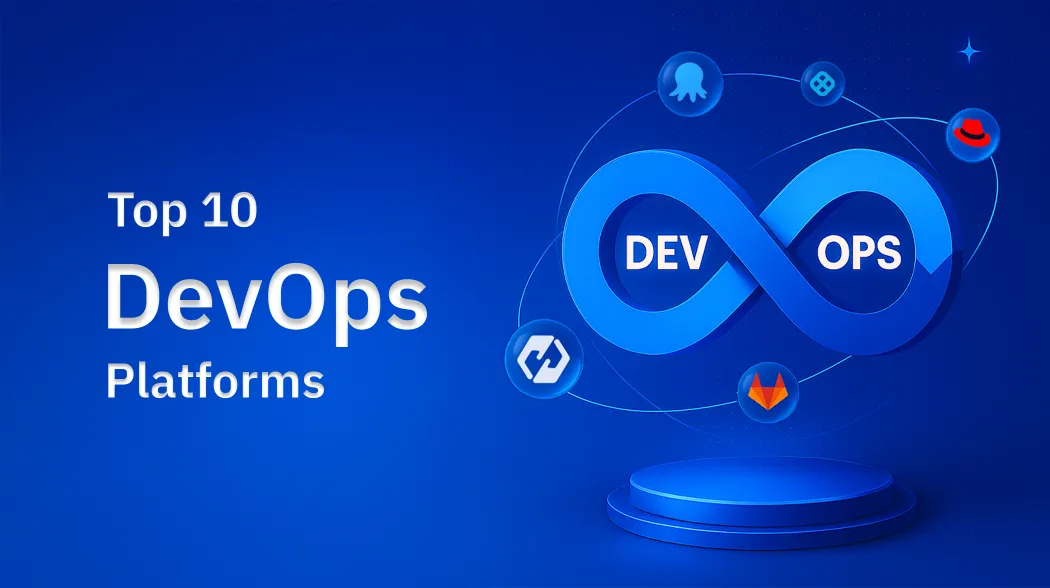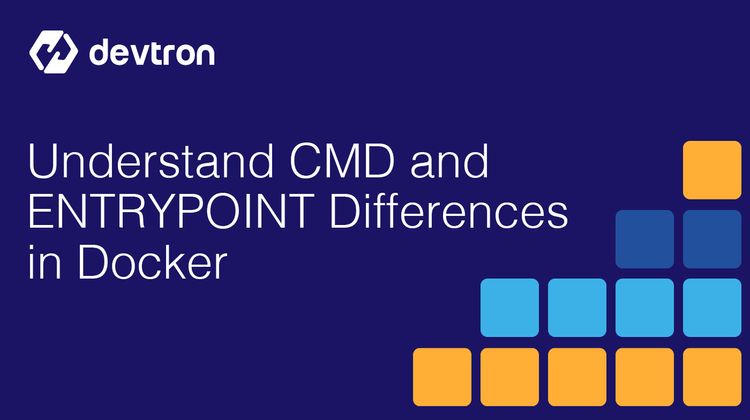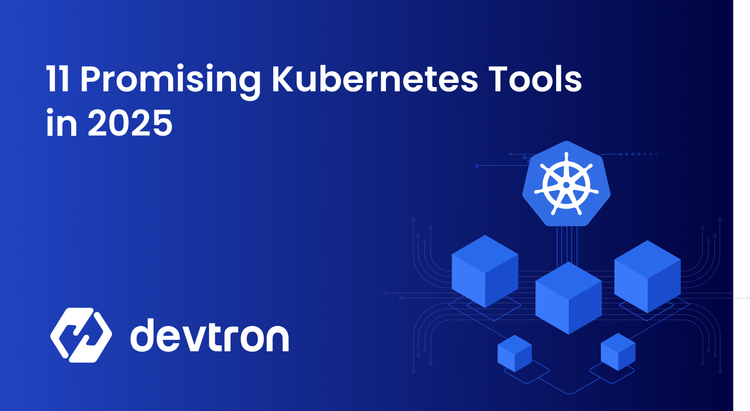What is the DevOps platform?
A DevOps platform brings all the tools and processes for building, testing, and deploying software into one place. It helps development and operations teams work better together, speeds up delivery, and makes the whole process more efficient. Automating tasks and keeping everything in one system reduces mistakes and supports continuous integration and delivery, making it easier to deliver reliable software quickly.
The majestical power of the DevOps platform is automation; it handles repetitive tasks like testing, reducing error, and faster delivery. This helps to smooth the workflow and provide a better quality of applications.
10 Best DevOps Platforms
Here are 10 of the best DevOps platforms that streamline workflows, boost collaboration, and accelerate your application.
1. Devtron

Devtron is the Kubernetes platform for DevOps, SRE, and developers. It's an application lifecycle management platform designed to simplify the management of cloud-native apps through a single, unified interface. With its native GitOps-powered CI/CD pipelines, Devtron ensures rapid, reliable deployments without compromising on control or compliance.
Features
- Centralized Dashboard: Devtron combines both CI and CD workflows in one centralized dashboard. This makes it easy to oversee deployments across multiple Kubernetes clusters and streamlines the entire delivery process.
- Policy-Based Deployments: Devtron supports integration with your preferred security scanners and allows you to set up custom compliance rules. This ensures that every release meets your organization’s governance standards.
- Controlled Deployments: Features like deployment windows, approval gates, and lock configurations give you full control over when and how changes go live, minimizing risks and avoiding disruptions in critical environments.
- GitOps-Enabled Pipelines: Devtron offers a GitOps-first approach right from the start. It eliminates the need to manually configure external tools , letting you follow GitOps best practices effortlessly.
- Flexibility: Devtron’s pipelines are highly flexible. You can plug in your tools and define custom tasks for both pre- and post-build or deployment stages, tailoring the CI/CD flow to suit your exact need.
Devtron also offers a free trial of Devtron Enterprise. If you're interested, you can follow the steps in this guide to request your free license.
License: Apache-2.0
2. Harness

Harness is a DevOps platform that is an AI-native software Delivery Platform. It offers tools for every phase of the application development lifecycle, such as Continuous Integration, Continuous Delivery, Feature Flags, Chaos Engineering, and Continuous Error Tracking.
Features
- AI automation: AI automates CI/CD, testing, and incident response, boosting speed and reducing manual effort throughout the software lifecycle.
- End-to-end DevOps coverage: It offers integration tools like Gitops infrastructure as Code, Chaos Engineering, and more, all in one platform.
- Security and cost optimization: Enhances security posture with shift-left testing and supply chain governance.
- Developer experience focus: Makes developers' work easier with quick setup tools, ready-to-use cloud workspaces, and helpful insights to improve productivity.
License: Apache-2.0
3. Gitlab

Gitlab is an open-source platform built around Git, a version control system. But beyond basic Git tracking, it also serves as a complete DevOps and DevSecOps solution. GitLab offers tools for planning, coding, testing, deployment, and monitoring covering the entire application lifecycle. With features like CI/CD automation, issue tracking, code review, and version control, GitLab streamlines complex workflows and reduces the need for multiple separate tools.
Features
- Unified DevSecOps tools: Access all critical development, security, and operations tools from a single platform.
- Faster delivery with automation: Speed up releases using AI-powered workflows and automation.
- Built-in security: Integrate security throughout the development cycle—right from the start.
- Flexible deployment: Deploy applications across any environment without cloud vendor restrictions.
License: Commercial
4. Red Hat OpenShift

Red Hat OpenShift is an enterprise Kubernetes platform and hybrid cloud application platform that provides tools and services for the entire application lifecycle, from development to deployment and management.
Features
- Manage across hybrid environments: Easily run and oversee applications across on-prem, public, and private clouds without disruption.
- Optimized with AI: Streamline the deployment of AI/ML models and cloud-native workloads with automation for faster and scalable delivery.
- Security and compliance at the core: Benefit from built-in protection features such as image scanning, RBAC, and secure software supply chains to meet compliance needs.
- Support container workloads: Seamlessly manage both traditional VMs and modern containerized apps within a unified cloud-native platform.
License: Apache-2.0
5. Azure DevOps

Azure Devops is a cloud-native platform that supports suites of tools and services. It adopts DevOps practices by simplifying the entire development and deployment workflow. It enables teams to streamline, coordinate, and control the delivery of applications and services through automation and efficient workflows. It provides services like version control, project tracking, CI/CD pipelines, automated testing, package management, and reporting.
Features
- Centralized dashboard: One can see everything in one place, your projects, builds, releases, and team progress.
- Easy code management: built-in Git tools to manage your code. It makes teamwork easier and helps you keep track of every change without a mess.
- Task planning: Organize your work using boards, to-do lists, and sprints. You can track progress and stay on top of goals without confusion.
- Fast and smooth CI/CD: Automate the steps from building to testing and deploying your app. This means quicker updates and fewer mistakes in every release.
License: Commercial
6. AWS DevOps service

The AWS DevOps service service platform provides AWS services with DevOps practices. It provides a variety of tools that help teams automate tasks, making applications run faster and reducing the manual effort needed to manage infrastructure with less manual effort.
Features
- Fast and reliable updates: With AWS CodePipeline, you can automatically build, test, and launch your software, making updates quicker and more dependable.
- Set up infrastructure with code: AWS CloudFormation lets you describe your servers, databases, and other resources in code, so everything is consistent and easy to recreate.
- Real-time performance tracking: Amazon CloudWatch helps you track how your apps and systems are performing in real time so you can fix problems before they grow.
- Build scalable apps: Tools like AWS ECS and Lambda make it easier to create microservices, small, flexible parts of an app that are simple to manage and grow.
License: Commercial
7. Copado

Copado is a native Salesforce DevOps platform that provides solutions for managing the Salesforce application delivery lifecycle. Copado makes it easier to build, test, and release updates in Salesforce. It brings everything from planning and coding to testing and security into one place.
Features
- Faster Releases: Copado automates the entire process, from building to testing and deployment, speeding up release cycles.
- Seamless Collaboration: It helps teams work together more efficiently by offering a central place for managing changes and progress.
- Built-in Quality: Automated testing and security checks ensure that each release meets quality standards.
- Full Visibility: Copado provides clear insights into your release process, helping teams spot issues early and improve workflow.
License: Commercial
8. Cloudbees

Cloudbees is a DevOps platform that makes it easier to build and deliver cloud-native software faster while keeping security and compliance in check. It helps teams automate CI/CD pipelines, manage feature flags smoothly, and keep track of delivery progress with real-time insights, all under one roof.
Features
- End-to-end software delivery: CloudBees helps automate the full software delivery process from building and testing to deploying and monitoring so teams can move faster with fewer errors.
- Enterprise-level Jenkins support: Known for its deep Jenkins expertise, CloudBees offers advanced features like high availability, easier setup, and strong security controls.
- Built-in DevSecOps: Security isn’t an afterthought. CloudBees has security and compliance checks built right into your workflows, making it a true DevSecOps platform.
- Feature rollouts: With feature flag tools, teams can safely release new features to users gradually, test them in real-time, and roll back easily if needed.
License: Commercial
9. Octopus Deploy

Octopus Deploy is a continuous deployment tool. It provides a centralized platform to automate deployments, manage releases, and monitor deployments across various environments, which include multi-cloud, hybrid, and on-premises systems.
Features
- Automated deployments made easy: Octopus takes care of your deployments by automating the process, cutting down on manual steps, and reducing the chance of errors.
- Manage releases from one place: It gives teams a single platform to track versions, roll back changes if needed, and promote updates across different environments.
- Works across all environments: Whether it’s development, testing, or production, Octopus supports smooth deployments across every stage.
- Connects with your CI tools: Octopus easily integrates with tools like Azure DevOps and Jenkins, helping teams build a full CI/CD pipeline with ease.
License: Commercial
10. Qovery

Qavery is a DevOps Automation Platform that eliminates your DevOps hiring needs. Provision and maintain a secure and compliant infrastructure in hours. This platform automates and simplifies cloud infrastructure management.
Features
- Easy cloud setup for developers: Qovery automates the setup of things like databases, domains, and load balancers, so developers don’t have to worry about the heavy lifting.
- Instant environments on demand: It lets you spin up temporary environments anytime, which makes testing new features fast and hassle-free.
- Works with any major cloud: Whether you’re using AWS, Azure, or GCP, Qovery supports them all, giving you the flexibility to choose what fits best.
- Built with developers in mind: From Git-based deployment to a smooth interface, Qovery is designed to keep developers focused on coding, not infrastructure.
License: Apache 2.0
Best Practices
Choosing the right DevOps platform isn't just about features, it’s about aligning with your team's specific goals and workflows. Here are five best practices to help you select the most suitable platform based on your requirements.
- Prioritize end-to-end automation: Automation-heavy platforms are a must if your team needs rapid delivery with minimal human intervention. This practice ensures consistency, reduces manual errors, and accelerates the release cycle. It also frees up your team to focus on innovation rather than repetitive tasks. Platforms like Devtron, Harness, or Octopus Deploy offer robust automation features for CI/CD, testing, and deployments.
- Ensure built-in security: Choose security-first platforms for regulated industries. If your industry is compliance-heavy (e.g., finance, healthcare), security-first platforms are ideal. This ensures data protection, regulatory compliance, and reduces the risk of breaches. Opt for platforms like Devtron, GitLab, CloudBees, or OpenShift with built-in DevSecOps features like scanning, RBAC, and secure supply chains.
- Supporting multi-cloud and hybrid environments: This ensures flexibility and avoids vendor lock-in. It also helps optimize performance and compliance across regions. Platforms like Devtron, Qovery, and Octopus Deploy support multi-cloud setups, making them great for teams needing infrastructure flexibility.
- Enable seamless collaboration and visibility: Seamless collaboration enhances efficiency by fostering communication and quick problem-solving across teams. It identifies issues early, enabling faster iterations and continuous improvements.Platforms like Azure DevOps, GitLab, and Copado offer centralized dashboards, project tracking, and shared insights.
- Focus on developer experience: Making the platform easy for developers helps them learn it quickly and get started faster. This means they can spend more time building features instead of figuring out how the tools work. Platforms like Qovery, Devtron, and Harness prioritize user-friendly interfaces, ready-to-use cloud environments, and low-code/no-code deployment options.
Conclusion
Choosing the right DevOps platform is less about picking the most popular tool and more about aligning it with your team's unique needs, workflows, and goals. By focusing on automation, security, flexibility, collaboration, and developer experience, you set the foundation for faster, safer, and more efficient software delivery.
FAQ
What is DevOps Platforms?
A DevOps platform brings all the tools and processes for building, testing, and deploying software into one place. It helps to automate tasks and keep everything in one system, reduces mistakes, and supports continuous integration and delivery, making it easier to deliver reliable software quickly.
What are some of the best platforms to start your DevOps
Devtron, Harness, Azure DevOps, GitLab, Octopus Deploy offer a variety of features to streamline workflows, improve efficiency, and ensure the reliability of your applications.
What should I look for in a DevOps platform?
Key features include CI/CD support, environment management, role-based access, integrations with version control systems, and built-in monitoring or observability.
What do AWS and Azure offer for DevOps?
AWS and Azure provide powerful DevOps platforms with tools to automate the software delivery process. They support CI/CD, infrastructure as code, and monitoring to help teams build, test, and deploy applications faster. AWS offers tools like CodePipeline and CloudFormation, while Azure provides services like Azure Pipelines and Repos, making it easier to manage the full development lifecycle.







